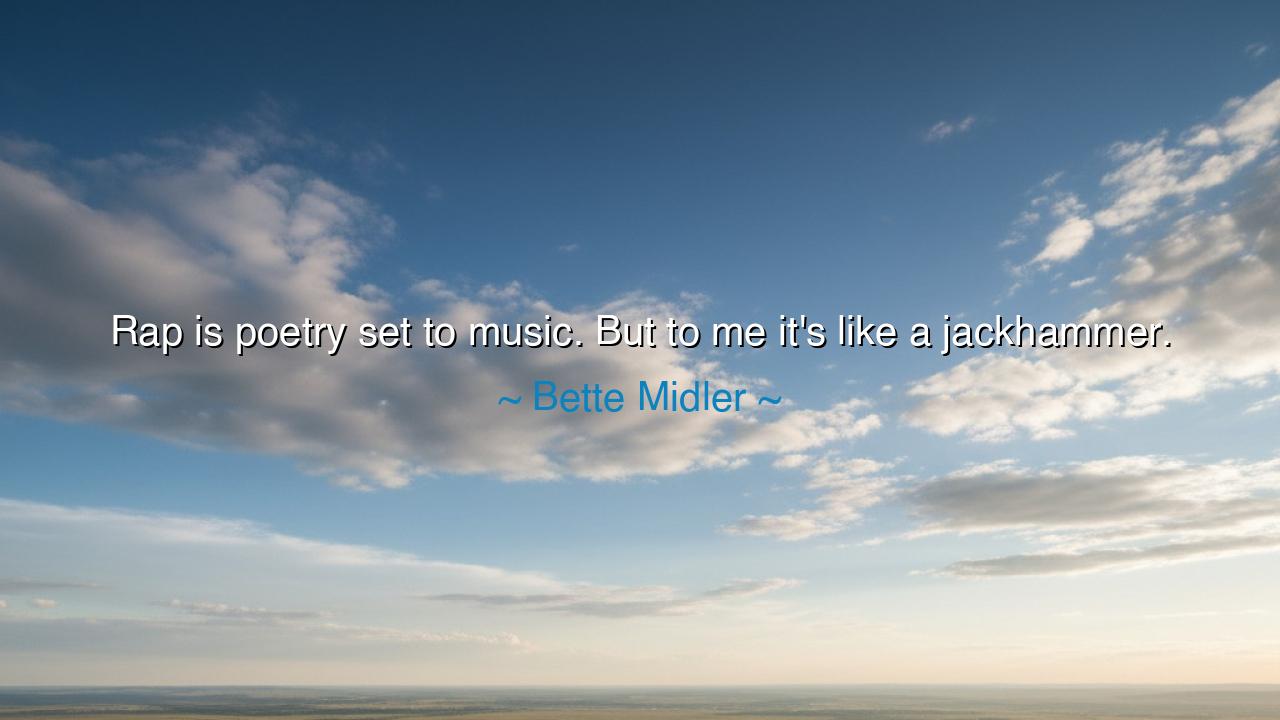
Rap is poetry set to music. But to me it's like a jackhammer.






"Rap is poetry set to music. But to me it's like a jackhammer." So spoke Bette Midler, and in her words lies both recognition and unease. She acknowledges that rap shares its roots with the oldest human art: poetry. Like the chants of shamans, the hymns of prophets, the verses of Homer, rap is rhythm bound to word, expression bound to beat. It is poetry clothed in new garments, spoken with urgency, pulsing with fire. Yet to Midler’s ears, this form does not soothe; it strikes with the relentless pounding of a jackhammer, loud, jarring, and insistent.
This tension between form and reception is ancient. For every new art that rises, there are those who see in it beauty and those who see disruption. When the tragedians of Greece first brought their dramas to the stage, some hailed them as divine revelation while others feared their emotional violence. When jazz thundered across the twentieth century, elders decried its wild rhythms even as youth embraced it as liberation. Midler’s words echo this eternal struggle: the clash between tradition’s ear and the cry of new expression.
To call rap a jackhammer is to acknowledge its purpose: not to whisper gently, but to break through concrete walls of silence. Rap was born in streets where voices were ignored, where truths of poverty, injustice, and survival were hidden beneath the polished surfaces of society. And so rap became the jackhammer, smashing through stone, forcing the world to hear. Its pounding rhythm is the pulse of urgency; its volume is the demand for recognition. It is poetry that refuses to be ignored.
History shows us how art often takes this form. Consider the writings of Émile Zola during the Dreyfus Affair. His essay J’Accuse! did not soothe; it shattered. It was not gentle verse, but a hammering cry of truth against injustice. In his time, too, many thought his voice harsh, relentless, and disruptive. Yet it was necessary, for only a pounding force could break the wall of lies. Rap, like Zola’s words, belongs to this lineage of art that chooses the jackhammer over the harp, the strike over the caress, because the times demanded it.
The lesson, then, is not to judge too quickly when art feels overwhelming. What jars the ear may yet awaken the soul. What feels harsh may in fact be the instrument needed to tear down walls of indifference. Poetry wears many forms: sometimes a lullaby, sometimes a psalm, and sometimes a jackhammer. To dismiss one form is to risk missing the truth it carries. Midler’s discomfort is honest, yet it opens the door to reflection: why does this art strike so hard, and what stone is it trying to break?
Practically, this means approaching every art form with humility. If rap seems too loud, too relentless, ask what message it carries that requires such urgency. If classical poetry feels too quiet or obscure, ask what truths lie in its subtlety. Each form answers a different human need, a different historical moment. We must learn to listen not only with our preferences but with our understanding, hearing the cry beneath the rhythm, the story beneath the sound.
So remember, children of tomorrow: rap is poetry set to music, and sometimes it is a jackhammer. But do not despise the jackhammer, for it breaks the stone beneath which truth has been buried. Let us honor all poetry—whether it whispers like the wind or strikes like thunder—for in each form, humanity speaks, resists, and survives. And if you find the sound harsh, do not turn away at once. Lean closer, and you may discover that the pounding rhythm is the heartbeat of a people demanding to be heard.






TDTham Thanh Dat
Rap as poetry is an interesting concept, and I understand Bette Midler’s comparison to a jackhammer. Rap’s beat and rhythm can sometimes feel like an assault on the senses. But doesn’t that intensity actually mirror the urgency of the messages it conveys? Could it be that the forcefulness she refers to is exactly why rap resonates so deeply with its audience?
ADNguyen Phan Anh Duong
It’s fascinating how music, especially rap, can evoke such strong reactions. While Bette Midler’s comparison of rap to a jackhammer might be negative for some, I wonder if she’s also missing the nuance in the genre. Rap is often about the message, the beat, and the flow—things that may seem harsh on the surface, but are deeply meaningful to its listeners. Could it be that she’s just not connecting with its depth?
BDChu be dan
Midler’s view of rap as a ‘jackhammer’ is interesting because it highlights how music genres can evoke very different emotional reactions. What she perceives as forceful and loud might be exactly what others find exhilarating and empowering. Can we really judge a genre like rap by how it makes us feel, or should we try to understand it in the context of the culture and experiences it represents?
GHKen Nguyen le gia huy
I get what Bette Midler is saying, but I also think it’s important to understand that rap, like any genre, is a form of expression that resonates differently with people. While she may find it too harsh or jarring, others might see the raw energy and rhythm as its core appeal. Is there a way for someone to appreciate rap’s lyrical complexity while still not loving its musical style?
HGHan Gia
Bette Midler’s comparison of rap to a jackhammer is a bold one. It makes me wonder if she’s critiquing the intensity or rhythm of rap music. Is rap too forceful for some people to appreciate, or does it simply have a style that’s different from more traditional forms of poetry? I think for some, rap’s rhythm and delivery may feel overwhelming, but for others, it’s exactly what makes it powerful.